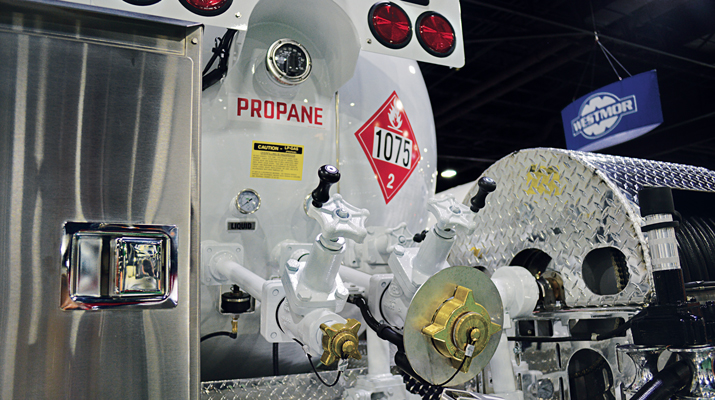Perpetual price shoppers strain propane supply relationships
Propane retailers get upset when customers abandon them to do business with their competitors, even if only a few cents per gallon separate the companies.
But some of these same propane businesses will walk away from their suppliers – or at least squabble with them – over a penny or a fraction of a cent per gallon.
Some retailers and allied trade representatives argue that it’s OK to do business this way. Others say it’s hypocritical to expect customer loyalty yet shop for the best price among suppliers.
Let the debate begin.
“The supplier of a propane marketer is not much different than that propane marketer,” says George Koloroutis, a consultant with Propane Concepts. “They want someone who will pay their bill and communicate with them effectively. They want someone who will perform on their contract.”
But some retailers are simply interested in getting the best price. As an example, they’ll sacrifice a good relationship with a supplier for a discounted spot load that becomes available.
Still, as nicely priced as some spot loads are, a regular pursuit of them has its disadvantages.
“You have not built out your allocation when you do that,” says Dave Bertelsen, national propane product manager at Valley National Gases and Matheson. “Suppliers take care of the people who take care of them.”
The same is true of retailers and the transport companies that serve them, Bertelsen adds. Those companies expect good communication and loyalty from retailers, and they don’t always get it.
Propane supply issues in late February of this year particularly shed light on the importance of building a good relationship with a transport company.
“The guys who are now desperate because of long hauls and having to bring product in are out there begging on their hands and knees to get transportation folks to have trucks available,” Bertelsen says, referring to a stretch in late February when the Midwest and Northeast faced their first significant distribution issues of the heating season. “They’re up against it now because they haven’t formed that partnership with their transportation folks.”
What are your priorities?
Lynn Sheets, petroleum manager at Iowa-based Key Cooperative, agrees partnerships are essential to operate effectively as a retailer.
Key Cooperative, which delivers about 10 million gallons of propane each year, buys all of its propane from Cenex, CHS’ energy brand. The co-op is one of more than 3,000 that owns Cenex, Sheets says. The more gallons Cenex sells, the greater the dividend Key Cooperative receives.
Still, even though the co-op is incentivized to buy Cenex propane, Sheets points out the disadvantages of continuously shopping around for the best price.
“I can spend a lot of time on purchases and watch for price,” he says, “and I might be able to squeeze an extra quarter of a cent per gallon out of my effort – that’s giving myself quite a bit of credit. But multiply that fraction times our gallons, and I want to make more money than that.”
In other words, Sheets says retailers should be using their time more wisely than looking for a load that’s a penny or two cheaper than another available load.
“Focus on efficiency,” Sheets says. “Get your drop sizes up. Get your miles driven per gallon down. That’ll get your number of drops down.”
Sheets makes another argument for supporting one supplier: Put yourself in their shoes and consider some of the infrastructural investments they’re making to make propane more readily available to you.
“We expect them to invest millions of dollars to take care of us, but then there are customers who leave them for a cent or two or five,” he says. “I’ve always had a little bit of a business philosophy that you should purchase as you sell. If you think price is all-important, then that’s what’s going to drive your customer base. In turn, that’s how you’ve got to purchase.”
Matt Weingart, plant manager at Salem Propane in Salem, Ohio, has a similar outlook on supplier-retailer relationships. Securing propane during the shortage of 2013-14 wasn’t easy for Salem Propane, Weingart says, but he believes a couple of factors related to his supplier helped to carry his company through the winter.
“I could tell as early as fall [2013] that supply wasn’t as plentiful compared to past years,” Weingart says. “Then, as the harsh winter became a reality, so did propane supply issues. But communication and loyalty with my supplier helped me prepare for the challenging days to come.”
Salem Propane, like many retailers, rationed fuel during the first two months of 2014. Availability, volumes and price were all unknowns at that time.
“When your job as a propane retailer is to supply propane to customers, those three unknowns made it very challenging at times,” Weingart says. “But Salem Propane was able to keep all of its customers with enough propane to get through the shortage of 2014.”
The same challenges
The winter of 2014-15 created similar challenges for retailers in certain regions.
According to Matheson’s Bertelsen, Midwest and Northeast retailers encountered some of the same issues they faced the winter before.
Extremely cold temperatures put the Northeast in turmoil, he says, and a Canadian rail strike hampered service along the East Coast. Put these together, and Bertelsen says retailers would have been wise to plan ahead.
“You better have a very solid supply plan in place that has contingency options A, B, C and even an option D for different pickup points,” he says in a late-February interview. “We’re going into what I’ve been told are ratable allocations for the month of March. I have never heard of that in my 35 years. That’s going to squeeze the market.”
As March allocations went into effect, Bertelsen expected those who appropriately planned with suppliers to fare best.
“The folks who do not plan and do not build allocation are sending their units and trucks to other points,” he says.
And those points are often a state or more away. So those March developments served to Bertelsen as yet another example of why a good supplier relationship is essential.
Transparency with suppliers has particularly helped Matheson these last few years, he adds.
“We’ve gone to tank monitoring at our storage facilities,” Bertelsen says. “Then we open that dashboard up to our supplier. They have access to see what is in our supply at any time. That has been extremely helpful.”
Propane Concepts’ Koloroutis, who offers supply-related advice to retailers, says one factor above all is most meaningful to suppliers: contract performance. Suppliers want retailers as customers who continuously deliver.
“If you’re a marketer who buys from a supplier, then you need to perform, especially in the months when that supplier really needs you to in the allocation-earning period,” Koloroutis says. “You will establish a great relationship with that supplier, and they will value you greatly.
“When you value them in [tough] times, you can believe you’re going to get preferential treatment,” he adds. “Your call is going to be the first one answered, and they are going to reciprocate what you do for them. That’s a really critical piece in the relationship.”
Retailers who don’t have strong connections with suppliers can always rely on brokers, Koloroutis says.
“A broker, in a lot of cases, can become the supply management team for a small retailer,” he says. “Look at Ferrellgas – they have Ferrell North America, their own supply group that manages their supply. If you’re a mom-and-pop retailer with one to five locations, you can’t hire a big supply team. So using a broker can sometimes fill that gap.”
Supply planning resource
Looking for helpful information on propane supply planning? The National Propane Gas Association published a 16-page report last year with recommendations for marketers and state associations. Click here for more information.
SPECIAL REPORT FROM LP GAS
The propane industry experienced one of the most challenging winter heating seasons on record in 2013-14. In preparation for future winters amid a changing energy environment, LP Gas is examining the issues that led to what some called a crisis supply situation. We are reaching out to all segments of the industry to explore our past and future, bringing attention to key subjects, initiating industry dialogue and providing necessary education to our readers.
















